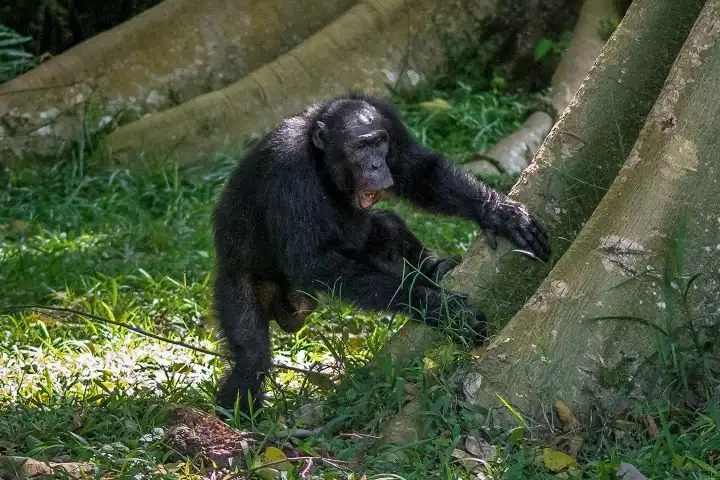

Every male chimpanzee who drums on the tree has a distinctive style (Pic. Courtesy smithsonianmag.com)
The sight of a male chimpanzee in Uganda’s rainforest rushing towards a tree while letting out a loud screeching sound and holding a huge tree root to strike at it may look incredible and amazing to laypersons but it is no strange behaviour for scientists.
A report in smithsonianmag.com quotes Catherine Hobaiter, telling BBC Inside Science: “If you hit [the roots] really hard, with a hand or a foot, it resonates and makes this big deep, booming sound that travels through the forest.”
Hobaiter is a primatologist from Scotland’s University of St. Andrews.
This conduct of male chimps has been known but a research paper which appeared in Animal Behaviour now unveils that each individual male’s drumming is distinctive and that it is done to inform others about his whereabouts and what he is doing. Interestingly this information is shared across long distances.
Speaking on this Hobaiter said: “We could often recognize who was drumming when we heard them; it was a fantastic way to find the different chimpanzees we were looking for. If we could do it, we were sure they could, too.”
For this study the researchers recorded 273 long-distance communications between eight chimpanzees. Thereafter, they analysed the acoustic structure of the drumming making note about varied attributes like the number of beats, the duration of the drumming, the interval between the beats and how vocalisations known as pant-hoots going with the drumming were timed.
Scientists gathered that drumming was done more when chimps were on the move and in smaller groups. Drumming while travelling exhibited individual differences. This as per authors suggested that the sounds “might serve to recruit or maintain contact with distant group members”.
Vesta Eleuteri, study’s lead author said this is “like chimp social media”. The cognitive biologist at Austria’s University of Vienna in Austria, in a statement stated: “Indeed, we also found that chimpanzees drum more often when they’re alone or in small groups. This means that they drum to know where others are and decide whether to join them or not.”
When not travelling, the chimps did not use their signature sounds. This, scientists said, may be to avoid identifying themselves or keeping competitors and seniors away from them.
The study’s authors feel that this new research will shed light on why chimps don’t say goodbye though they greet each other. Elaborating on this, Hobaiter said: “The chimps might not need to say goodbye, because they’re effectively able to keep in touch while they’re away. These long-distance signals give the chimps a way to check in with one another. That might help us to understand one of these things that we thought was a real difference between chimps and humans—and help us to understand why that difference might have come about.”
Australia's High Commissioner to India, Philip Green OAM, called Yoga one of India's gifts to…
The Bharat Sanchar Nigam Limited (BSNL) has announced the soft launch of BSNL Quantum 5G…
The Indian Embassy in Iran has said that the embassy will make efforts to evacuate…
India's gross direct tax collections for the financial year 2025-26 rose by 4.86 per cent…
Russian President Vladimir Putin has said that Moscow is not seeking Ukraine's unconditional surrender, but…
Extending his greetings on the 11th International Day of Yoga, Lok Sabha speaker Om Birla…